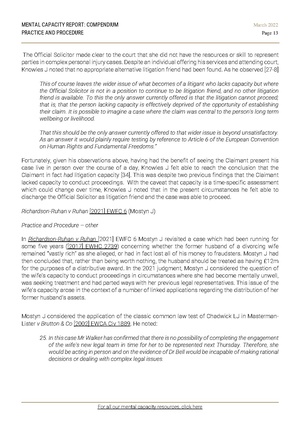Richardson-Ruhan v Ruhan [2021] EWFC 6
Litigation capacity A literal interpretation of the Masterman-Lister test would suggest that in the absence of legal advice and representation the wife would be legally incapacitated and the court would be obliged to appoint a litigation friend, which had two problems: (a) it creates circular reasoning, in that if a litigation friend secures representation the incapacity would disappear; (b) if capacity depends on the presence of advice and representation, then it would depend also on its quality, which would be difficult to investigate: the capacity to conduct proceedings cannot depend on whether the party receives no legal advice, or good legal advice or bad legal advice. The judge decided that if the party would be capable of making the necessary decisions with the benefit of advice then she has capacity whether or not she actually has the benefit of that advice, and if the party is unrepresented the solution is an adjournment in order for representation to be secured rather than the protracted and elaborate procedure of appointing a litigation friend. The wife had the relevant capacity, and the hearing was adjourned.
Essex
This case has been summarised on page 13 of 39 Essex Chambers, 'Mental Capacity Report' (issue 120, March 2022).The following categories (in blue boxes) can be clicked to view a list of other pages in the same category:
